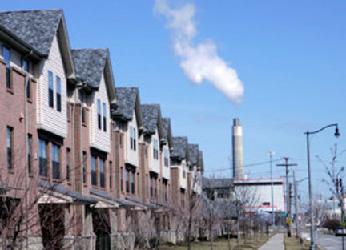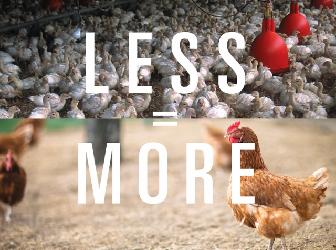Michigan Chapter Update
December 7, 2014
In This Issue:
- Lame Duck, Lame Environmental Proposals
- Clean Energy Legislation Introduced, But Too Late for This Year
- Concerned About Food, Ag, Animals? Then Save the Date: March 9, 2015!
- Wayne County Exceeds Acceptable Levels of Sulfur Dioxide
- Looking for a Few Good Volunteers to Work on Oil & Gas
- Do You Have Design and Layout Expertise?
- Join the Sierra Club or Give the Gift of Membership
- Thank You!
Lame Duck, Lame Environmental Proposals

Pollution pours from an incinerator in Detroit. Legislation being considered in the lame-duck session in Lansing would allow the burning of old tires and solid waste to count as renewable energy. |
Sierra Club is currently battling two lame environmental bills the Michigan legislature is entertaining during its lame-duck session. The first is HB 5205, which would classify the burning of solid waste as a form of renewable energy and allow for the construction of new incinerators. Sierra Club opposes this proposal because waste incineration does not produce clean energy -- it emits more carbon dioxide per unit of energy than any other form of electricity, greatly contributing to the negative consequences of climate change.
We're also fighting SB 910, which would prohibit the Michigan Department of Environmental Quality from enforcing air pollution regulations on wood heaters. Unregulated wood heaters account for 13% of the country’s soot pollution and have major public health implications such as increased risk of heart disease, asthma, and lung disease.
On the positive side, we support SB 795-800 which would increase prison time and fines for illegally introducing prohibited, non-native aquatic species (like Asian Carp or Zebra/Quagga mussel) into Michigan's waters. We also like HB 5397, which would allow municipal utility providers to fund residential clean energy programs through on-bill payments. This legislation is crucial to helping homeowners to get financing for efficiency upgrades and renewable energy projects.
Let your elected officials know how you feel about these four environmental proposals! Please take a moment to look up your State Senator and State Representative. Have questions or want to get involved? Contact Anne Woiwode at anne.woiwode@sierraclub.org or 517-484-2372 x 11.
Clean Energy Legislation Introduced, But Too Late for This Year
Three bipartisan bills to expand Michigan’s 2008 renewable energy and energy efficiency laws were introduced in November, just as the legislature entered its lame-duck session. The current law, which expires next year, mandates that electricity providers meet a 10% renewable energy requirement, and that electric and natural gas utilities achieve annual energy optimization standards. The bills, HB 5967(Schmidt), 5968 (Dianda) and 5969 (VerHuelen),
are expected to be reintroduced in the 2015 legislative session.
Sierra Club welcomes the long overdue debate on renewing and expanding the current clean energy laws, particularly because legislation under debate this year would gut the current laws. However, there are concerns that this package falls short on several counts. For example HB 5968 sets a strong but voluntary goal (unlike the 2008 law) for Michigan’s electric utilities to increase renewable energy by 1.5% per year in their generation portfolio.
“Michigan families from Ironwood to Monroe need Lansing to work as fast as possible to move our state beyond fossil fuels to protect health and fight climate change,” said Michigan Chapter Chair David Holtz. “It's time to hold utilities like DTE and Consumers Energy accountable to what our state really needs--a clean energy future fueled by renewable energy.”

Watch this space for details about "Farming Our Future: The Forces and Faces of 21st Century Agriculture," a conference presented by Less=More on March 9, 2015. |
Concerned About Food, Ag, Animals? Then Save the Date: March 9, 2015
A groundbreaking conference exploring the political, legal, and historical forces that shape farming in Michigan today and how to chart a path to a more sustainable food system takes place March 9, 2015 on the campus of Michigan State University during MSU’s historic Agriculture and Natural Resources Week.
Presented by the Less=More Coalition, Farming Our Future: The Forces and Faces of 21st Century Agriculture will channel diverse national, regional and local conversations about the environmental, economic and social impacts of modern agriculture into a comprehensive forum to facilitate joint efforts to build a better food system.
Look for more details in this e-newsletter and on the Less=More Twitter feed @MoreforMichigan and on the Less=More Facebook page at: https://www.facebook.com/MoreforMichigan.
Wayne County Exceeds Acceptable Levels of Sulfur Dioxide
Wayne County is experiencing a crisis in sulfur dioxide (SO2) emissions, a powerful pollutant that comes from coal plants and other sources that reacts with nitrogen oxide to create acid
rain and can cause or aggravate health issues. People with
cardiovascular disease or chronic lung disease, as well as children and
the elderly, are most likely to suffer from health problems linked to
elevated sulfur dioxide levels.
Wayne County is the only county in Michigan to be designated as having SO2 levels that exceed what is considered acceptable.
The Michigan Department of Environment Quality (MDEQ) is working to
bring the levels under control, but the process, which requires a public
hearing, has been delayed by months from its projected date already. Sierra Club is tracking the MDEQ as it develops a plan to ensure it includes a solution that addresses the heart of the problem -- 85% of all sulfur dioxide emissions in Wayne County come from three DTE Energy facilities, two of which are coal plants.
A transition to cleaner energy is the only way to help ensure clean air for Wayne County residents. Click here to learn more. |
|
|
|
No comments:
Post a Comment